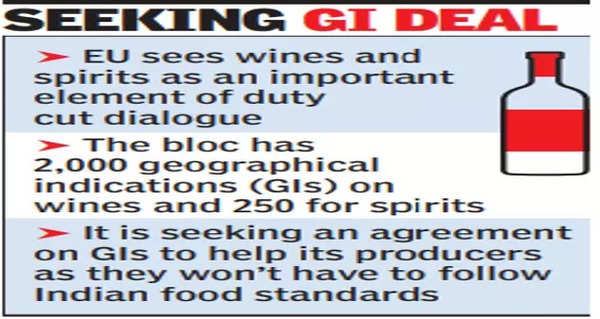“It is still early in the negotiations as six rounds have been completed. But we would want duties to be significantly reduced in the first year and hope that it is phased out over five years,” said Ulrich Adam, director general spirits EUROPE, an industry lobby group, which was part of a delegation that travelled to India last week.His suggestion came with the rider that states should not increase domestic levies to make up for the price gap.

Like the UK, where Scotch is a key item for tariff cuts, the EU sees wines and spirits as an important element of the dialogue of reduction in duties. Given that it has 2,000 geographical indications (GIs) on wines and 250 for spirits, accounting for almost half the GI tags in the trading bloc, EU is also seeking an agreement on GIs to help its producers as they will not have to comply with food standards in India, among other benefits.
A sharp reduction in duties in India — currently estimated at around 150% — is, however, seen to be detrimental for the domestic industry, which wants to protect its turf. Adam said allowing bulk items to be imported into the country will ensure that there is domestic bottling and related activities, besides arguing that local producers, who specialise in the dominant brown drinks, will not be significantly impacted by the tariff cuts as white spirits wines have a small share of the market.
“I don’t think so. It’s the price point (for drinks)… It takes time,” Adam said, adding that there is a large shipment of bulk consignments from the EU to the US, where the final product is bottled for the American market.
“It (duty cuts) has worked in other FTAs and it has shown to deliver results… it can act as an accelerator of trade,” he added.





